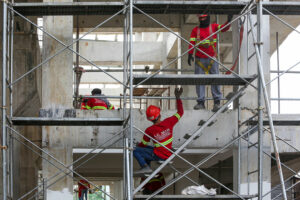PCCI opposes P200 daily wage hike
THE PHILIPPINE Chamber of Commerce and Industry (PCCI) is opposing the proposed P200 across-the-board daily minimum wage hike for workers. “A blanket national minimum wage (hike) does not take into account the differences in the cost of living across regions as well as the unique needs of businesses based on the specific industry, location, and […]

THE PHILIPPINE Chamber of Commerce and Industry (PCCI) is opposing the proposed P200 across-the-board daily minimum wage hike for workers.
“A blanket national minimum wage (hike) does not take into account the differences in the cost of living across regions as well as the unique needs of businesses based on the specific industry, location, and type of labor they need. Cities have higher costs of living versus rural areas,” said PCCI President Enunina V. Mangio in a statement on Monday.
The business group’s statement came after a House Committee on Labor approved last week a bill that will grant a P200 across-the-board wage increase for private-sector workers.
“Legislating a single wage for all areas can harm businesses in lower-cost regions and remove the flexibility of the Regional Wage Boards to set wages that are aligned with the situation in the local areas. This could lead to business inefficiency and stagnation,” Ms. Mangio said.
According to the PCCI, Congress should leave the determination of wage hikes to the Regional Wage Boards, which were “created and designed to set region-specific rates based on the local cost of living.”
Ms. Mangio said that although the wage hike is meant to improve the livelihood of workers, it is expected to lead to higher labor costs, which may lead to a spike in the cost of goods and services.
“Micro, small, and medium enterprises (MSMEs) are already operating on tight margins. The mandated wage hike will force these small enterprises to shoulder higher payroll expenses,” she said.
“For some businesses, particularly those in low-margin industries like retail, hospitality, and agri-food, the wage increase forces them to pass on the cost to consumers,” she added.
This inflationary effect, she said, will erode purchasing power, which will negate the intended benefit of the wage increase while reducing jobs in the market.
“Making everyday items more expensive will simply offset the benefits of a higher wage, especially for workers in the low-income brackets. But the inflationary effect will bear down more on workers in the informal sector who are not bound by the minimum wage law,” she added.
The PCCI noted the across-the-board wage increase is expected to push microenterprises to shift operations to the informal sector to cut costs.
Only 25-30% or 10-12 million of the total employed workforce are in the formal sector, while the informal sector accounts for 40-50%, representing 15-20 million workers.
“A legislated minimum wage hike not only exacerbates the already rising cost of goods and unemployment but also fails to provide long-term solutions for productivity and competitiveness,” said PCCI.
“Instead of legislating wages, our wage policy should have a comprehensive approach that balances the needs of workers with the capacity of businesses and ensures that MSMEs continue to thrive while still providing fair wages,” it added. — Justine Irish D. Tabile


















